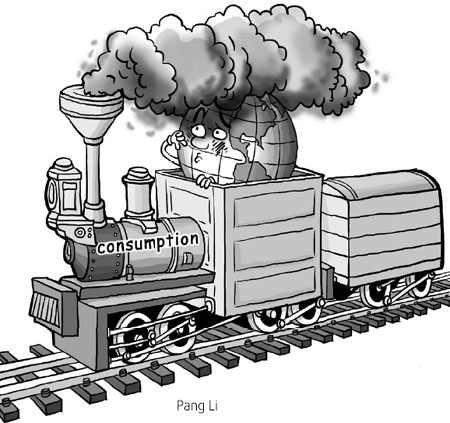Consumption isn't what it's cranked up to be
The word "consumption", when used in economics and politics as a panacea to the global financial crisis, is unscientific and anachronistic.
A road map to the so-called recovery based on consumption is like a journey on an Earth flat. Earlier, it was reasonable to say we consume food and energy and other resources, and that businesses anyway produce them for consumers. But any scientist will know energy cannot be produced or consumed, and the same for every atom of oxygen, every atom in H2O water, in food, and all material resources.
Energy and matter are transformed, and the amount on Earth, with the exception of sunlight, is finite.
The number of atoms can be counted in the air, water and land we deal with, 10 km up, 10 km down, an apple-skin layer around the Earth. The figure is a five followed by 49 zeroes. It is a fixed number. It is not going to grow, unless a sizeable asteroid strikes us.
Even then, it would probably be rock, not chocolate or gold or ice (that would be nice - we need water) and would almost certainly not contain elaborately transformed gadgets we could copy.
It is no secret that food and water flow through the human body, and we can deal with it. A factory is also analogous to an organism that has inputs and products. Now, that many parts of the globe are crowded with factories, we realize, apart from inputs of solid and liquid raw materials, we have an absolutely equal output of solids, liquids and gases - it is scientifically objective to appreciate that as throughputs.
The global financial crisis has writers and speakers grasping for a concept they term the "Real Economy". This presumably means a concrete set of goods and services, admittedly so complex that it can only be aggregated and accounted for in money equivalents. That is fine for hamburgers, cars, houses and bridges. But Bernie Madoff swindled $50 billion, AIG wrote off $5 billion in a quarter, a stimulus package of about a $1 trillion? How many hamburgers is that and where do they come from?
If the economy is now a mindset of financial solutions, hope is in vain. The word we should be grasping for is humility.
At the Boao Forum, the President of Mongolia was one speaker who struck on this theme. What conventional economists call consumption and growth needs to be appreciated as wise, economical, and yes, humble.
A majority of political leaders would be horrified if accused of pushing blind consumption and growth, but the distinction can be lost when it is repeated unthinkingly. Casinos are great money-spinners for business, but on a net global scale, are horrible. A million Internet cafes, averaging a hundred youths punching at computer games, can show as growth for a while, but are more like the euphemism for cancer.

Soothsayers now talk of financial cycles, as if they could predict the bottoming out and upturn (heard these terms lately?). The real cyclic upturns are not magical or predestined but discoveries of technologies - bronze, iron, paper, gunpowder, steam engines, scientific chemistry, penicillin, plastics, and yes, computers and the Internet. It seems nice to throw the shells down and say what's coming next. It's safer to know what season is next, and be skeptical on snake oil.
The analogy of the human organism for modern economic production is useful at two levels of understanding.
Firstly, consumption is balanced with outputs. Not one atom disappears, if we account for exhalation of carbon from carbohydrates mixed with oxygen from the air, and we adjust for any increase in body weight.
Secondly, the human body experiences growth from babyhood to adulthood, but can only do so by throughputting and understanding the need for food and oxygen, in part into even higher and more complex flesh and blood, and hopefully brain, but in greater part, as excrement.
Scientists summarize the phenomenon as inexorably increasing entropy (shit happens). For industries, the phenomenon is precisely the same. The economic product is termed good and so-called consumers will pay for it. But every factory output is in aggregate net negative. When we discover this about our body, we do not get shocked and refuse to eat. It is even managed by primitive people, and in cities of over 10 million people. Hopefully well managed, and of course at a cost.
And there is one final acknowledgement of throughputting, which needs to become part of our perspective.
The human body does not live in isolation, but in a wonderfully complex set of cycles of planet purification, water, oxygen, other elements, and balanced temperature. Do you know what would happen if we did not have oceans to absorb our shit?
We did not need to understand it until advances in the Industrial Revolution impacted nature, first in localities and now globally. A 1997 article in Nature estimated the value of the annual services of Natural Capital (the services Earth provides free to the Real Economy) is about double the global GDP.
No way can we ever dream of paying back, we are just depleting it. There is no way the air and ocean can purify the CO2 that comes from 18 billion tons of fossil fuel burned just in 2008.
It is like 10 people living and smoking in an elevator for a week. You want to try throughputting all that?
The author is a Beijing-based independent Australian researcher collaborating with Tsinghua University and China Agricultural University.
(China Daily 04/23/2009 page9)














